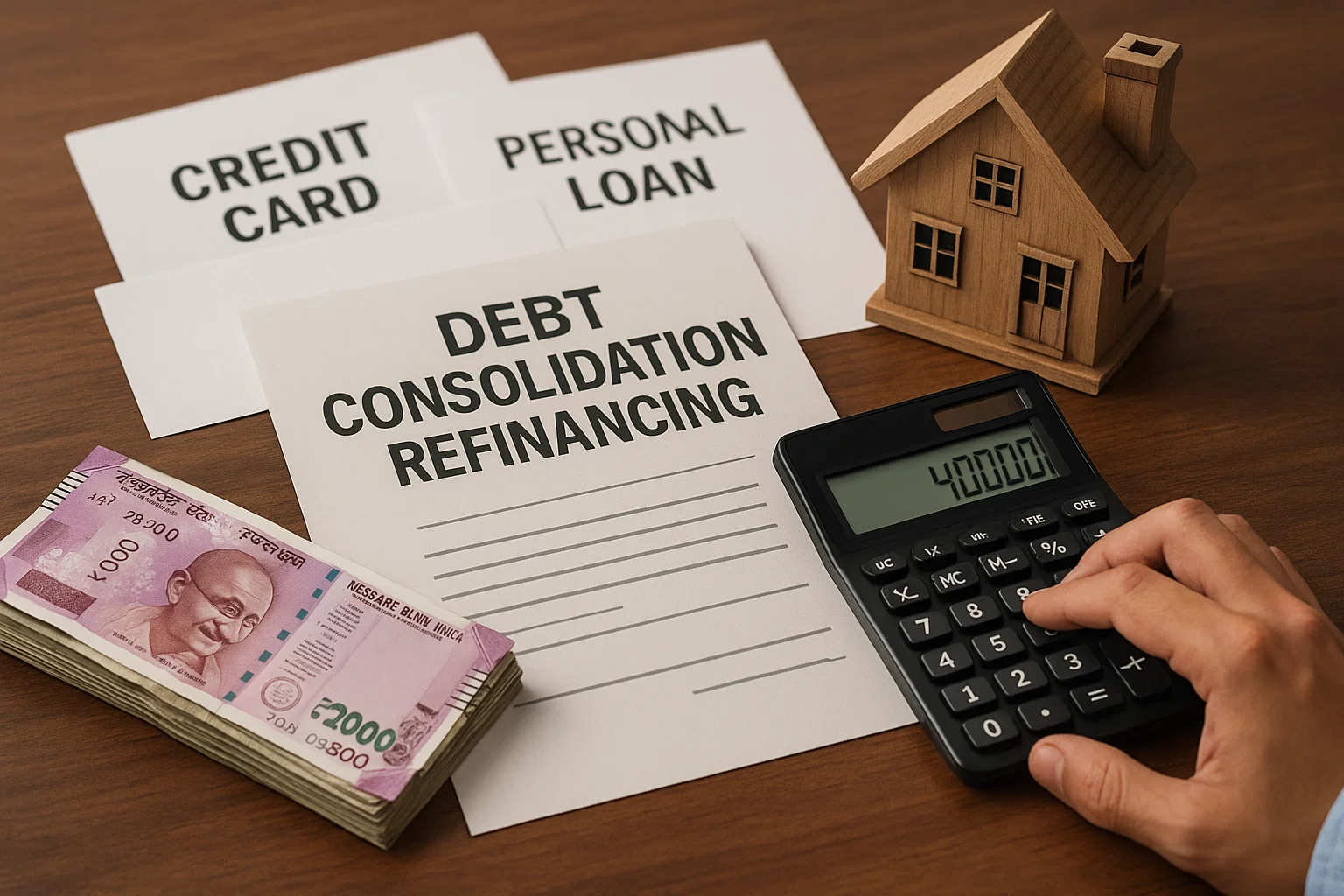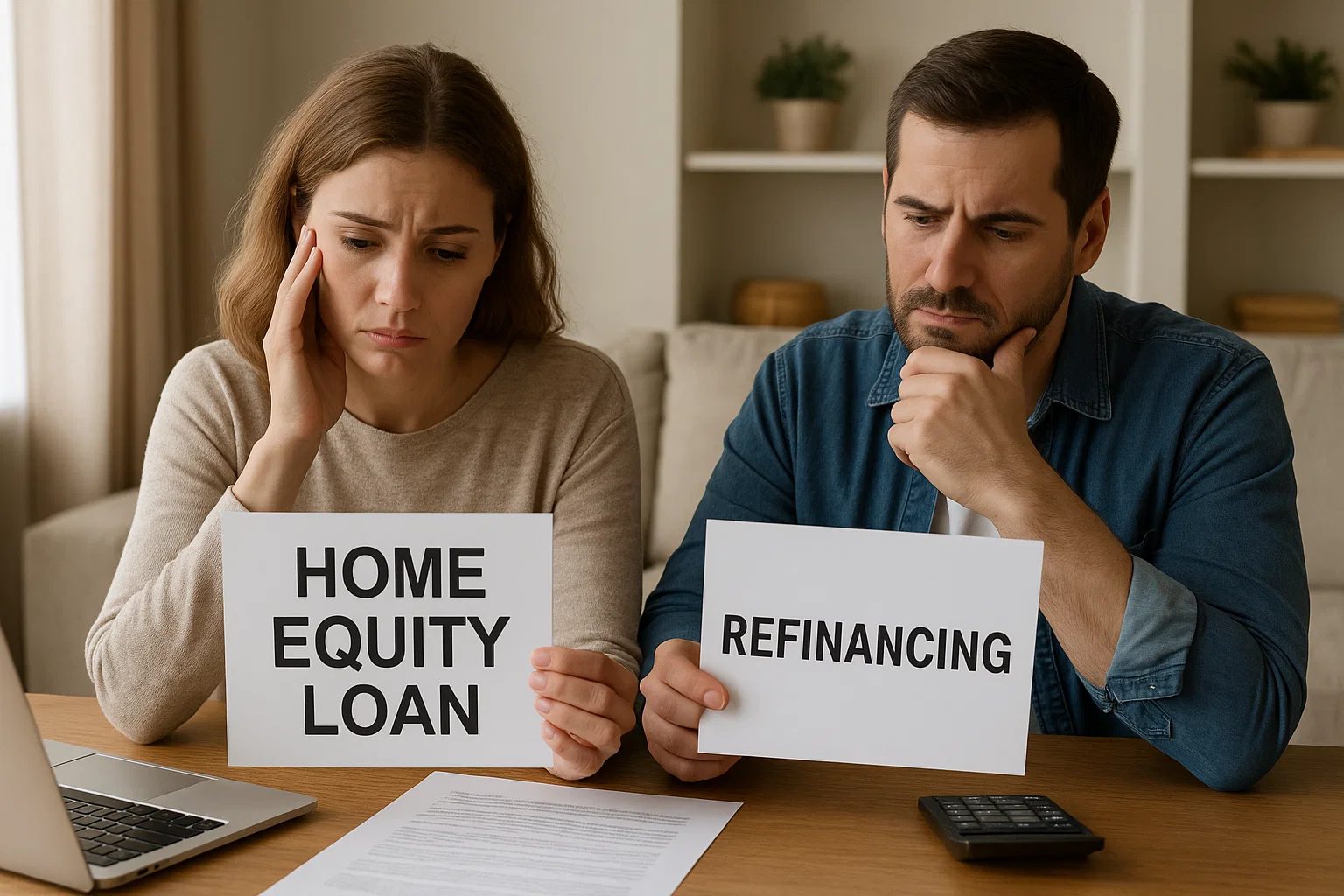Debt Consolidation Through Home Loan Refinancing: Simplifying Multiple Financial Obligations
November 19, 2025
.png)
Managing multiple loan payments each month—home loan, car loan, personal loans, credit card bills—can feel like juggling flaming torches while walking a tightrope. Different due dates, varying interest rates, multiple lender portals, and the constant mental tracking drain both financial resources and emotional energy. For homeowners who've built equity in their property, debt consolidation through refinancing offers a strategic pathway to transform scattered obligations into a single, manageable payment at potentially lower overall interest costs.
Understanding Debt Consolidation Refinancing
Debt consolidation refinancing involves replacing your existing home loan with a larger mortgage that covers both your current home loan balance and your outstanding high-interest debts. The new lender pays off your original mortgage plus your credit cards, personal loans, or other qualifying debts, leaving you with one consolidated loan secured against your property.
This approach leverages your home's equity—the difference between its current market value and what you owe on it. If your home is worth ₹80 lakh and you owe ₹45 lakh, you have approximately ₹35 lakh in equity. You could refinance to a new ₹60 lakh loan, using ₹45 lakh to clear your existing mortgage and ₹15 lakh to eliminate credit card debt, personal loans, or other high-interest obligations.
The fundamental advantage lies in interest rate differentials. Home loans typically carry rates between 8-10%, while credit cards charge 18-42% annually and personal loans range from 11-24%. By consolidating higher-interest debts into your mortgage, you reduce the weighted average interest rate across all borrowings, translating to substantial monthly savings and reduced total interest paid over time.
The refinancing process for consolidation mirrors standard refinancing: you approach lenders with your consolidation proposal, submit financial documentation including details of debts to be consolidated, undergo property appraisal to confirm available equity, and close on the new loan that simultaneously pays off your old mortgage and targeted debts.
Key Questions Before Consolidating Debt

- Do you have sufficient home equity to cover your debts? Your property value must exceed your current mortgage plus the debts you want to consolidate, typically requiring at least 15-20% equity buffer.
- Are your other debts carrying significantly higher interest than home loans? Consolidation makes most sense when you're replacing debts at 15%+ interest with mortgage rates under 10%.
- Can you commit to not accumulating new high-interest debt? Consolidation fails if you clear credit cards only to max them out again within months.
- Will you stay in your home long enough to benefit? Refinancing involves upfront costs that require several years to recover through savings.
When Debt Consolidation Refinancing Makes Strategic Sense

Debt consolidation refinancing becomes particularly valuable when you're managing multiple high-interest obligations that collectively strain your monthly budget. Consider someone paying ₹15,000 monthly on credit cards at 36% interest, ₹12,000 on a personal loan at 16%, and ₹35,000 on their home loan at 9%—total monthly outflow of ₹62,000 across three separate payments.
By consolidating the credit card and personal loan debts (totaling ₹12 lakh) into their mortgage through refinancing, they could potentially reduce their combined monthly payment to around ₹48,000-50,000, saving ₹12,000-14,000 monthly while simplifying to a single payment. The interest savings compound dramatically over years, potentially saving lakhs in total interest charges.
This strategy proves especially effective for homeowners who've accumulated equity through property appreciation or principal payments, possess good credit scores that qualify for favorable refinancing terms, and demonstrate stable income capable of supporting the consolidated loan amount.
Medical emergencies, education expenses, or business investments sometimes necessitate taking multiple loans over short periods. Rather than managing these disparate obligations indefinitely, consolidation refinancing allows you to restructure comprehensively, aligning repayment with your actual financial capacity and long-term plans.
Life transitions also create consolidation opportunities. Homeowners approaching retirement might consolidate debts to reduce monthly obligations before income decreases. Others refinance to consolidate when switching careers or relocating, ensuring financial stability during transitional periods.
Calculating Your Consolidation Advantage
Real scenarios clarify whether consolidation refinancing serves your situation. Imagine Raj and Priya from Mumbai managing a ₹40 lakh home loan at 8.5% (₹35,000 monthly), ₹8 lakh personal loan at 14% (₹18,000 monthly), and ₹4 lakh credit card debt at 30%+ (₹15,000 monthly)—total of ₹68,000 in monthly payments.
Their home's current value is ₹75 lakh, providing sufficient equity to consolidate. They refinance to a new ₹52 lakh loan at 8% for 15 years, resulting in approximately ₹50,000 monthly payment—saving ₹18,000 monthly or over ₹2 lakh annually. Beyond immediate cash flow relief, they eliminate the mental burden of tracking three separate payments and due dates.
Factor in refinancing costs of approximately ₹1.5 lakh (processing fees, legal charges, appraisal). With ₹18,000 monthly savings, they recover these costs in roughly 8-9 months. Every subsequent month represents pure savings that can be redirected toward investments, emergency funds, or lifestyle improvements.
Over the 15-year loan term, the interest savings compared to maintaining separate high-interest debts could exceed ₹25-30 lakh—a transformative amount that fundamentally alters their financial trajectory and retirement readiness.
Critical Considerations for Debt Consolidation
- Assess consolidation costs comprehensively. Beyond refinancing fees, consider prepayment penalties on existing loans and ensure total costs don't negate savings.
- Evaluate your debt accumulation patterns honestly. If you consistently overspend, consolidation without behavioral change simply creates a larger debt problem later.
- Understand you're converting unsecured debt to secured debt. Credit cards and personal loans don't risk your home; a consolidated mortgage does if you default.
- Compare consolidation refinancing against alternatives. Balance transfers, debt management plans, or personal consolidation loans might suit your situation better depending on equity and credit profile.
- Calculate break-even timelines realistically. Ensure you'll remain in the property long enough for savings to exceed upfront costs, typically requiring 2-3+ years.
Building Your Debt Consolidation Strategy
Debt consolidation through refinancing isn't a quick fix for financial mismanagement—it's a structured approach to optimizing debt repayment when you've built sufficient home equity and qualify for better terms than your current obligations carry. Success requires honest assessment of your spending patterns, commitment to avoiding new high-interest debt, and realistic planning around your housing stability.
Start by listing all debts with their balances, interest rates, and monthly payments. Calculate your total monthly debt obligation and weighted average interest rate. Then research refinancing options to determine what consolidated terms you'd qualify for and calculate the actual monthly and lifetime savings. Only proceed if the numbers demonstrate clear, substantial advantage.
Partner with lenders experienced in consolidation refinancing who can clearly explain how the process works, what documentation you'll need, and what costs to expect. Transparency matters enormously—seek institutions that disclose all fees upfront and don't pressure you into rushed decisions. Consolidation represents a major financial restructuring deserving careful consideration.
In 2025's challenging financial environment, where inflation pressures household budgets and high-interest consumer debt remains widespread, debt consolidation refinancing provides homeowners a powerful tool for regaining financial control. Your accumulated home equity represents stored financial capacity—deploying it strategically to eliminate destructive high-interest debt can fundamentally improve your financial health.
Approach consolidation with discipline: calculate savings meticulously, understand the risks of converting unsecured to secured debt, and commit to financial behaviors that prevent debt reaccumulation. When executed thoughtfully, consolidation refinancing transforms scattered financial obligations into a single, optimized payment structure that supports long-term wealth building rather than perpetual debt cycling.

Alex Chen

Alex Chen













Get in touch with a loan officer
Our dedicated loan officers are here to guide you through every step of the home buying process, ensuring you find the perfect mortgage solution tailored to your needs.
Options
Exercising Options
Selling
Quarterly estimates
Loans
New home

随时了解有见地的文章和指南。
每周一,你将获得一篇文章或指南,这将帮助你在工作和个人生活中更具活力、更专注和更有成效。





.png)
.png)
.png)
.png)
.png)
.png)
.png)
.png)
.png)
.png)
.png)
.png)
.png)
.png)
.png)
.png)
.png)
.png)
.png)
.png)
.png)
.png)